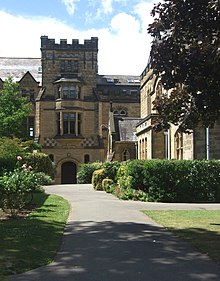Peter Fincham
Peter Fincham | |
|---|---|
 Fincham in 2014 | |
| Born | Peter Arthur Fincham 26 July 1956 |
| Nationality | British |
| Education | Tonbridge School |
| Alma mater | Churchill College, Cambridge |
| Employer(s) | TalkBack Productions BBC ITV |
| Title | Controller ofBBC One(2005–2007) Director of Television forITV(2008–2016) |
Peter Arthur Fincham(born 26 July 1956) is a British television producer and executive. From 2008 until 2016, he was the Director of Television for theITVnetwork. He was also formerly the Controller ofBBC One,the primarytelevision channelof theBritish Broadcasting Corporation,[1]until his resignation on 5 October 2007, following criticism over the handling of theMonarchy: The Royal Family at Workdebacle.
Early life[edit]

Fincham was educated at the independentTonbridge School,and then studied atChurchill College, Cambridge.He joined theCambridge Footlightsproduction team as musical director, alongside a committee which includedGriff Rhys Jones,Jimmy Mulville,Rory McGrathandClive Anderson.After leaving Footlights, Fincham composed songs, none of which were picked up for recording, and then worked on the touring version ofGodspell.During a period of increasingly common unemployment, Fincham was walking onWandsworth Commonin the rain and thinking to himself: "Oh my God. What have I done? I have made the wrong decision?"[2]Fincham applied for a job at the BBC in 1984, a position as a researcher onThe Late, Late Breakfast Showafter his friendHelen Fieldingleft to concentrate on her writing career. However, he was unsuccessful in this application.[3]
Career[edit]
TalkBack (1985–2005)[edit]
In 1985 he joined the staff of the independent production companyTalkBack Productionsas aproducer.At the time the company, which was founded by comediansMel SmithandGriff Rhys Jones,producedradio programming,television advertisements and corporate videos.[4]Fincham became the company's managing director in 1986,[4]and in 1989 oversaw the move of TalkBack into fully-fledged television production when it produced its founders'sketch showSmith and Jonesfor BBC One.[5]
TalkBack became particularly well known for its comedy output, which included such shows asThe Day Today(BBC Two,1994),Knowing Me Knowing You with Alan Partridge(BBC Two, 1994),They Think It’s All Over(BBC One, 1995–2006),Never Mind the Buzzcocks(BBC Two, 1996–2015),I'm Alan Partridge(BBC Two, 1997 and 2002),Smack the Pony(Channel 4,1999–2003) andDa Ali G Show(Channel 4, 2000). Fincham was an executive producer on many of these programmes.[4]He also helped to establish TalkBack as a noted producer in other genres, with the company moving into drama withStephen Poliakoff'sShooting the Past(BBC Two) in 1999.
In 2001, Fincham was given anIndie Awardfor outstanding contribution to the independent production sector.[1]Also that year, TalkBack was sold toFremantleMediain a £62 million deal,[5]which made Fincham personally amulti-millionaire.[3]Fremantle merged TalkBack with another of its acquisitions,Thames Television,to form the newTalkback Thamesproduction company, of which Fincham became the Chief Executive in February 2003.[4]He remained in this position until he left at the beginning of 2005, after twenty years at TalkBack and its successor company, claiming he wanted "a new challenge and a new adventure".[3]BBC One controllerLorraine Heggessey's appointment to his old post opened up the vacancy at BBC One, which he in turn applied for and won despite being "rich enough never to have to work again".[5]
BBC One (2005–2007)[edit]
Fincham was regarded in some quarters as a surprising choice as Controller, as prior to his appointment he had never worked for either the BBC or any other broadcaster, having spent his career in the independent production sector.[6]In 2006,The Guardiannewspaper reported that he was ultimately responsible for an annual programming budget at BBC One of £873 million.[7]
Fincham oversaw the commissioning of successful BBC One programmes such asJane Eyre,How Do You Solve a Problem Like Maria?(both 2006) andRobin Hood(2006–09).[8]His first full year in charge saw a year-on-year growth in the channel's audience share, with BBC One earning a 23.6% share in August 2006, compared to 22.2% in the same month in 2005.[9]
Fincham directly initiated the creation of both the early evening current affairs and lifestyle programmeThe One Show(2006–present) and the prime time chat showDavina(2006), the latter designed as a vehicle for presenterDavina McCall.[10]However,Davinawas a critical and ratings disaster,[11]which Fincham subsequently admitted was personally his fault, although he defended the strategy of experimenting with the BBC One schedule.[7]He made another notable change to the schedule in January 2007, when he moved thecurrent affairsseriesPanoramaback from Sunday nights to the prime time Monday evening slot it had been removed from in 2000, although this decision was at least partly in response to a demand from theBoard of Governors of the BBCfor the channel to show more current affairs programming in prime time.[12]
It was also Fincham's decision to scrap the BBC One"Rhythm and Movement"idents,which had been used to provide the channel with its on-screen identity between programmes since they were introduced by Heggessey in 2002.[13]They were replaced by a new set of idents, known as the"Circle idents",in the autumn of 2006; however, Fincham again found himself criticised, this time byThe Daily Telegraphnewspaper, for the decision to spend £1.2 million on the set of eight ten-second films, some of which were shot in Mexico andCroatia.[14]Fincham also found himself having to publicly defend the £18 million salary the BBC awarded presenterJonathan Rossin 2006,[15]although Ross's BBC One work – which primarily consisted ofFriday Night with Jonathan Ross,Film...and various one-off events – formed only part of his BBC commitment, which also encompassed programmes forBBC ThreeandBBC Radio 2.
On 18 May 2007, Fincham decided to drop the Australian soap operaNeighboursfrom BBC One after twenty-one years on the channel, when its producers increased the price they wanted the BBC to pay for it in a bidding war.[16]Fincham commented that: "We'd love to have kept it but not at any price."[16]
Fincham was involved in a further controversy in July 2007, when introducing a press conference to publicise BBC One's forthcoming autumn season programming for later in the year. The season launch tape shown to journalists included a trailer from the documentaryMonarchy: The Royal Family at Work.It showedthe Queenapparently storming out of a session with American photographerAnnie Leibovitzover a disagreement about what she should wear, but the BBC subsequently admitted that one of the shots used in the trailer had been edited out of order.[17]Fincham admitted the error, and initially rejected calls that he should resign from his position as a result.[18]However, the publication of theWyattReport[19]on 5 October led to his resignation.[20]
ITV (2008–2016)[edit]
On 28 February 2008 it was announced that theITVnetwork, the BBC's main rival, had hired Fincham to be its new Director of Television.[21]At theEdinburgh Television Festivalin August 2008, Fincham claimed that broadcasters such as ITV were under too much pressure from industry regulatorOfcomto produce programmes that were only of a minority interest, as opposed to pure entertainment programmes for a mainstream audience.[22]In 2010 he decided to axe the long-running drama seriesThe Bill;ATV News Network reported 97% of the public were against the drama being dropped.[citation needed].In December 2011, he took the unilateral decision to remove a song fromThe Jonathan Ross Showthat was commissioned especially for the show by the comedian and songwriterTim Minchin.The song, titled "Woody Allen Jesus", had already been approved by Ross's producer and ITV's legal compliance officers. Minchin, disappointed at the decision, later made the footage available on his own site where he also criticised Fincham's decision.[23]
In January 2016, ITV announced that Fincham had decided to step down as Director of Television and leave the company.[24]
Personal life[edit]
Fincham's wife, Clare, runs a charity, Second Space,[25]which provides respite care for the ill and disabled and their carers. Fincham's family live in London. In music, he enjoysBob DylanandNeil Young.[26]
Outside of broadcasting, Fincham co-editedThe Utterly Utterly Merry Comic Relief Christmas Bookwith authorDouglas Adamsin 1986.[27]
References[edit]
- ^ab"Biographies – Peter Fincham – Controller, BBC One".BBC.November 2006. Archived fromthe originalon 12 January 2006.Retrieved10 January2011.
- ^Snoody, Raymond (8 October 2007)."Peter Fincham: The reluctant controversialist".The Independent.London. Archived fromthe originalon 16 July 2007.Retrieved8 October2007.
- ^abcSnoody, Richard (25 March 2005)."Bringing a comic touch to BBC 1".The Daily Telegraph.London.Retrieved10 January2011.
- ^abcdBarnes, Anthony (27 March 2005)."Heard the one about the man who will save BBC1 comedy?".The Independent.London. Archived fromthe originalon 1 October 2007.Retrieved19 January2007.
- ^abcGibson, Owen (28 March 2005)."Putting the fun into BBC1".The Guardian.London.Retrieved19 January2007.
- ^Timms, Dominic (24 March 2005)."Fincham an 'inspired choice'".The Guardian.London.Retrieved19 January2007.
- ^abGibson, Owen (15 May 2006)."Davina was all my fault".The Guardian.London.Retrieved19 January2007.
- ^Snoddy, Raymond (23 October 2006)."Back the BBC to hang on to its viewers in the multi-channel age".The Independent.London. Archived fromthe originalon 30 September 2007.Retrieved19 January2007.
- ^"Channel 4's Big Brother hangover".The Guardian.London. 18 October 2006.Retrieved19 January2007.
- ^Wells, Matt (6 September 2006)."The One Show gets another go".The Guardian.London.Retrieved19 January2007.
- ^Sutcliffe, Thomas (14 March 2006)."Don't blame Davina for this disaster".The Independent.London. Archived fromthe originalon 15 June 2006.Retrieved19 January2007.
- ^Sherwin, Adam (19 January 2006)."Panorama to take on ITV soap".The Times.London.Retrieved19 January2007.
- ^"25. Peter Fincham".The Guardian.London. 17 July 2006.Retrieved19 January2007.
- ^Alleyne, Richard (27 September 2006)."BBC splashes out £1.2m on circle of life TV links".The Daily Telegraph.London. Archived fromthe originalon 24 October 2007.Retrieved10 January2011.
- ^Sherwin, Adam (10 June 2006)."BBC's £18m deal makes Ross best-paid presenter".The Times.London.Retrieved19 January2007.
- ^ab"BBC pulls out of Neighbours fight".BBC News.18 May 2007.Retrieved18 May2007.
- ^"BBC apologises over Queen clips".BBC News. 12 July 2007.Retrieved13 July2007.
- ^"I stay, says royal row BBC boss".BBC News. 13 July 2007.Retrieved13 July2007.
- ^"Wyatt Report on HM Queen documentary".BBC Trust.5 October 2007. Archived fromthe originalon 10 November 2012.Retrieved8 October2007.
- ^"BBC One boss quits over Queen row".BBC News. 5 October 2007.Retrieved5 October2007.
- ^Tryhorn, Chris (28 February 2008)."Fincham replaces Shaps in ITV shakeup".The Guardian.London.Retrieved1 March2008.
- ^"TV schedules 'need entertainment'".BBC.23 August 2008.Retrieved23 August2008.
- ^Minchin, Tim(22 December 2011)."I'm NOT on the Jonathan Ross Show".
- ^"Peter Fincham steps down as ITV director of television".BBC News. 18 January 2016.Retrieved1 September2016.
- ^url=https://www.cafonline.org/system/charity-profile.aspx?friendlyUrl
- ^Thorpe, Vanessa (27 March 2005)."The producer".The Guardian.London.Retrieved8 October2007.
- ^"Douglas Adams".Britannica Concise Encyclopedia.2007.Retrieved19 January2007.[permanent dead link]
